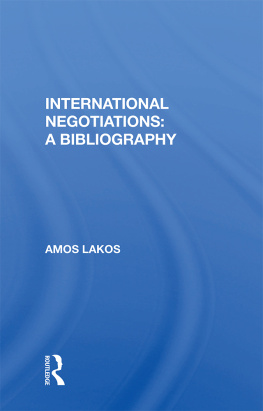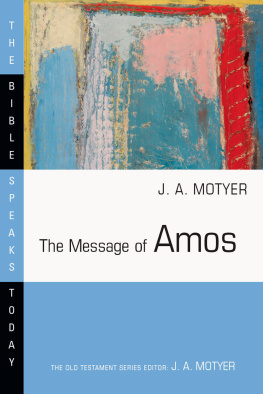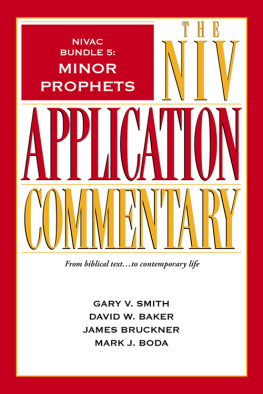About the Book and Author
The international system comprises a plurality of sovereign states often pursuing conflicting interests. One means of resolving or managing conflicts between those states is diplomatic bargaining or negotiation. In the last fifteen years, the study of negotiation has attracted researchers from various disciplines in the social sciences, and the volume of materials on negotiating behavior has grown dramatically. This bibliography systematically organizes all English-language materials on negotiation. Books, journal articles, doctoral dissertations, government documents, and conference reports are categorized by theories of negotiation, the psychological aspects of negotiating behavior, game theory, mediation studies, multilateral negotiations, arms control, diplomacy, and international trade. A complete author and title index is also included.
Amos Lakos is a librarian specializing in political science materials at the University of Waterloo. He is the author of International Terrorism: A Bibliography (Westview).
First published 1989 by Westview Press, Inc.
Published 2018 by Routledge
52 Vanderbilt Avenue, New York, NY 10017
2 Park Square, Milton Park, Abingdon, Oxon OX14 4RN
Routledge is an imprint of the Taylor & Francis Group, an informa business
Copyright 1989 Taylor & Francis
All rights reserved. No part of this book may be reprinted or reproduced or utilised in any form or by any electronic, mechanical, or other means, now known or hereafter invented, including photocopying and recording, or in any information storage or retrieval system, without permission in writing from the publishers.
Notice:
Product or corporate names may be trademarks or registered trademarks, and are used only for identification and explanation without intent to infringe.
Library of Congress Cataloging-in-Publication Data
Lakos, Amos, 1946
International negotiations: a bibliography / by Amos
Lakos.
p. cm.(Westview special studies in international
relations)
Includes index.
ISBN 0-8133-7558-4
1. Diplomatic negotiations in international disputes
Bibliography. I. Title. II. Series.
Z6464.Z9L32 1989
[JX4473]
016.3272dc19 87-32600
CIP
ISBN 13: 978-0-367-01471-1 (hbk)
Our international system consists of a plurality of sovereign states, each pursuing its own interests and objectives. Diplomatic negotiation is the method by which conflicts between states are managed, resolved or terminated. The U.N. Charter recognizes negotiations as the best method for the peaceful resolution of conflicts. As long as there are conflicts between states, with the added spectre of nuclear proliferation and confrontation looming over, negotiations are the only sensible process of survival.
Lately, scholars have been attempting to lay the theoretical framework for the study of negotiations. This is a relatively new area of study, since strategies of war and battle have received much more systematic analysis. More efforts are being devoted to analyzing the problems inherent in peaceful coexistence, and attempts are made to clarify and define the nature of negotiations.
There exist a number of definitions to negotiations. I will just note here some of the elements common to all negotiations. The process of negotiation involves at least two parties who are engaged in a process of bringing differing viewpoints towards the achievement of a common agreement. The common interest is the achievement of an agreement. In the process, the parties undertake a redefinition of their interests. The parties engage in some sort of social interaction designed to influence each other's perceptions. The unifying element in all negotiation processes is that of problem solving. The aim of negotiations is to clarify and simplify complex issues and differences, so that resolution to the conflicts can be achieved. The nature of the subject to be negotiated, its framework and the behavioral strategies and tactics employed by the negotiators all contribute to the outcome of any given negotiation. Negotiators are always faced with tactical dilemmas concerning appropriate behavior in difficult situations. They cannot predict accurately the consequences of various behaviors, nor can they accurately predict all the potential solutions. Among the numerous factors influencing the outcome of negotiations, one can mention the personality of the negotiators, the nature or importance of the conflict, the setting of the negotiations, tactics employed by the parties and the pressures exerted on the negotiators to reach agreement. Negotiations have their own internal dynamics that influence the process and the outcome.
The primary focus of this bibliography is to identify and classify materials pertaining to the processes of diplomatic negotiations. The focus is on materials dealing with the process of negotiation, rather than with the content of specific negotiations. This presents certain difficulties, because the materials that deal with specific case studies also inevitably deal with policy issues. Invariably, studies of individual negotiations have to examine the issues being negotiated to be able to really study the negotiating strategies and tactics involved.
Much of the literature of negotiations is interdisciplinary. Researchers from various disciplines are contributing to the literature: labor relations, economics, psychology, sociology, international relations and law all have a contribution to make. Materials from these various disciplines have to be analyzed to see how they relate to the study of negotiations between states.
The bibliography is restricted to materials pertaining to the 20th century and published in the English language. It is classified into twelve major subject chapters and each subsection is arranged by form of material - monographs, journal articles, conference papers, government documents and dissertations. The bibliography excludes news magazine and newspaper articles.
The Negotiation Theories and Processes chapter lists materials of general nature which attempt to define and deal in a general way with negotiation theories and with negotiation processes. The Psychological and Sociological Aspects chapter covers materials dealing with behavioral aspects of negotiations, various psychological and sociological influences on the negotiation process with special emphasis on international negotiations. The chapter on Game Theory reflects the large literature of the theory of games - a mathematical discipline which investigates the optimal behavior of participants in games of strategy. This chapter is restricted to studies dealing with international interactions with particular emphasis on negotiations. The Mediation chapter covers the literature of peaceful settlement processes involving third parties. This chapter covers both theoretical works and case studies of international mediation. Multilateral Negotiations is a large chapter covering materials dealing with negotiations between more than two states, international bodies as forums of negotiations, conference diplomacy, north-south group negotiations, the Law of the Sea as an example of multilateral negotiations and other case studies. Materials dealing with Arms Control form another large chapter. Its focus is the processes of negotiating the various post World War II nuclear arms control agreements. It is made up of a large section on general materials dealing with the issues of negotiating arms control, and is further subclassified by the major nuclear arms control negotiations and conferences. The chapter on Summit Meetings focuses on the personal diplomacy of heads of state. This chapter is restricted to summit meetings and conferences between the United States and the Soviet Union and the multilateral economic conferences between the Western Powers. The next chapter deals with International Trade Negotiations. It covers bilateral and multilateral economic and trade negotiations, both through theoretical investigations and through case studies. Oil diplomacy, commodity negotiations, GATT issues, specific trade practices of the Soviet Union, China and Japan are highlighted, as well as the special aspects of trade between the U.S. and Canada. Diplomacy is a chapter which deals with diplomacy as a subset of negotiations between states. This may be a semantic difference, as most formal negotiations between states are negotiated by diplomats, using diplomatic protocols, customs and conventions. However, I found it impossible to completely integrate the large literature of diplomacy into the other chapters. Although the focus is on negotiation processes, the material included covers diplomatic methods, some diplomatic history, diplomatic memoirs, unofficial diplomacy and public diplomacy. Case studies of diplomatic negotiations are covered by the other chapter in the bibliography. The chapter on Soviet Diplomacy and Negotiation Behavior covers materials examining Soviet diplomacy and negotiating tactics and their evolution through time from the early Leninist foreign policy axioms to the Gorbachev changes. The chapter on United States Diplomacy examines materials dealing mainly with the processes of U.S. diplomacy. It includes materials on the State Department's role in the processes of international negotiations and examines U.S. diplomatic methods and case studies. The last chapter, Case Studies , attempts to list materials on particular negotiations. This chapter focuses on particular conflicts, such as the Middle East Conflicts and the Vietnam War negotiations and the Korean Conflict. Other case studies are highlighted because of their national characteristics, such as the Chinese and Japanese cases, while African and Latin American case studies are classified for geographical reasons. Canada - U.S. negotiation case studies are also highlighted.














